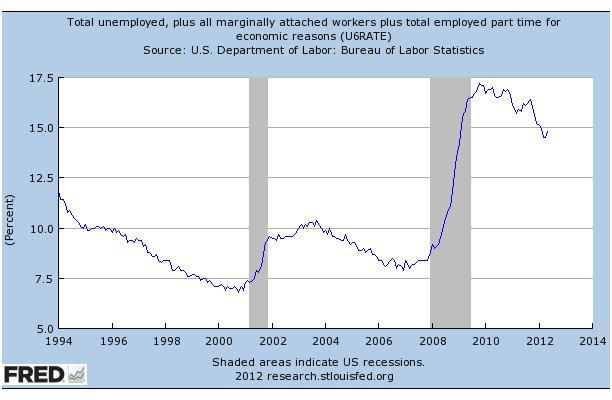Economic Recovery Slowed by Foreclosure and Health Care Policies

Economic recovery in the United States may be slowed by government policies on foreclosures and health care. Foreclosures rose in May for the first time in 27 months due to a mortgage-abuse settlement.
"That the May numbers were up the month after that settlement was completed is an indication that lenders are more confident that there are clear ground rules to foreclose now, so they can play by the rules," explains RealtyTrac.
Foreclosure starts were up sharply in April and May, as were bank repossessions. These new rules will allow banks to clear out distressed property faster. But will this hurt or help economic recovery? We’re not creating jobs in the United States, at least not yet, even as foreclosures potentially mean more homeless. The May unemployment report showed 14.8% unemployed up from April's 14.5%, on the U-6 broad scale on unemployment.
The U-6 report data is significant because it also includes the underemployed and those still looking for jobs but who are not counted in the standard unemployment figures. Thus it gives a better picture of what is happening than adjusted figures. The figures are grim.
“The median forecast for monthly jobs growth in the April-June period plummeted to 97,000 from 155,000."
This is not enough to keep people in their homes. Jobs and foreclosures need to be major campaign issues. The economy is still unstable, due to multiple factors and this is making employers unsure of what to expect.
“When employers are unsure of what will happen next or are overwhelmed by the complexity and cost of new regulations, they don't expand, innovate or hire. They simply hunker down and wait," says commentator Don Brunell.
This is exactly what we are seeing in the job market, since only 69,000 jobs were added in May, lower than the median forecast. Brunell adds that the Obama Administration and federal government need to quit making it worse.
The cost of health care reform remains a concern to many as they feel it could hamper economic recovery.
“Many believe the new law will just add to our growing pile of debt. It’s also making it harder for small businesses to hire new workers, compounding the economic pain…would cost about $2.1 trillion over the next decade according to the Congressional Budget Office,” says Rep. Fred Upton (R-MI), Chair of the House Committee on Energy and Commerce.
Senator John Brasso (R-WY) echoes that sentiment.
As a former orthopedic surgeon in Wyoming, Senator Barrasso has a vested interest in the United States health care industry. During his remarks to the Senate, he mentioned several companies he had worked with while working as a Wyoming surgeon, companies who have been forced to relocate to other countries and cut American jobs because of the health care tax.
Economic recovery needs to be the primary goal of the country now.




